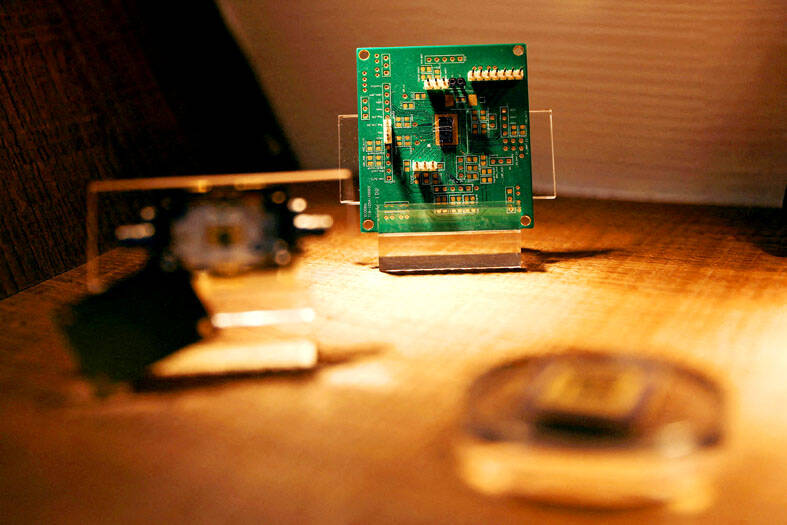The White House is seeking to renegotiate US CHIPS and Science Act awards and has signaled delays to some upcoming semiconductor disbursements, two sources familiar with the matter told reporters.
The people, along with a third source, said that the new US administration is reviewing the projects awarded under the 2022 law, meant to boost US domestic semiconductor output with US$39 billion in subsidies.
Washington plans to renegotiate some of the deals after assessing and changing current requirements, the sources said.

Photo: Ann Wang, Reuters
The extent of the possible changes and how they would affect agreements already finalized was not immediately clear. It was not known whether any action has yet been taken.
Four sources with knowledge of the discussions told reporters that the White House is concerned about many of the terms underpinning the Chips and Science Act industry subsidies.
Those encompass additional clauses, including requirements added into contracts by the administration of former US president Joe Biden, including that recipients must use unionized labor to build factories and help provide affordable childcare for factory workers.
The Semiconductor Industry Association, a trade group representing the chip industry, has started asking members how the program could be improved.
However, David Isaacs, vice president of government affairs for the group, said that “it’s important both the manufacturing incentives and research programs proceed without disruption.”
“We stand ready to work with [US] commerce secretary nominee [Howard] Lutnick and other members of the Trump administration to streamline the program’s requirements and achieve our shared goal of strengthening US leadership in chip technology,” Isaacs added.
Since taking office, Trump has issued a series of executive orders aimed at dismantling diversity, equity and inclusion programs across the federal government and the private sector.
One of the sources said that the White House is also frustrated by companies that accepted CHIPS Act subsidies and then announced significant overseas expansion plans, including in China. The law allowed some investments in China.
Intel, for example, announced a US$300 million investment in a Chinese assembly and test facility in October last year after saying in March that it had won a major award under the CHIPS Act.
Many of the biggest recipients of the CHIPS Act funding — including Intel, Taiwan Semiconductor Manufacturing Co (TSMC, 台積電), Samsung Electronics and SK Hynix — all have major manufacturing facilities in China.
Intel said it had received two payments totaling US$2.2 billion in funding from the CHIPS Act, but declined to comment.
A TSMC spokesperson said that the company had received US$1.5 billion in CHIPS Act monies before the new administration came in as per the milestone terms of its agreement.
Samsung, SK Hynix and Hemlock Semiconductor Corp declined to comment, while Bosch referred reporters to the Chips Office.
Micron Technology Inc and GlobalFoundries Inc did not respond to requests for comment.

Three experts in the high technology industry have said that US President Donald Trump’s pledge to impose higher tariffs on Taiwanese semiconductors is part of an effort to force Taiwan Semiconductor Manufacturing Co (TSMC, 台積電) to the negotiating table. In a speech to Republicans on Jan. 27, Trump said he intends to impose tariffs on Taiwan to bring chip production to the US. “The incentive is going to be they’re not going to want to pay a 25, 50 or even a 100 percent tax,” he said. Darson Chiu (邱達生), an economics professor at Taichung-based Tunghai University and director-general of

‘LEGACY CHIPS’: Chinese companies have dramatically increased mature chip production capacity, but the West’s drive for secure supply chains offers a lifeline for Taiwan When Powerchip Technology Corp (力晶科技) entered a deal with the eastern Chinese city of Hefei in 2015 to set up a new chip foundry, it hoped the move would help provide better access to the promising Chinese market. However, nine years later, that Chinese foundry, Nexchip Semiconductor Corp (合晶集成), has become one of its biggest rivals in the legacy chip space, leveraging steep discounts after Beijing’s localization call forced Powerchip to give up the once-lucrative business making integrated circuits for Chinese flat panels. Nexchip is among Chinese foundries quickly winning market share in the crucial US$56.3 billion industry of so-called legacy

Taiwan Semiconductor Manufacturing Co (TSMC, 台積電) yesterday held its first board of directors meeting in the US, at which it did not unveil any new US investments despite mounting tariff threats from US President Donald Trump. Trump has threatened to impose 100 percent tariffs on Taiwan-made chips, prompting market speculation that TSMC might consider boosting its chip capacity in the US or ramping up production of advanced chips such as those using a 2-nanometer technology process at its Arizona fabs ahead of schedule. Speculation also swirled that the chipmaker might consider building its own advanced packaging capacity in the US as part

A move by US President Donald Trump to slap a 25 percent tariff on all steel imports is expected to place Taiwan-made steel, which already has a 25 percent tariff, on an equal footing, the Taiwan Steel & Iron Industries Association said yesterday. Speaking with CNA, association chairman Hwang Chien-chih (黃建智) said such an equal footing is expected to boost Taiwan’s competitive edge against other countries in the US market, describing the tariffs as "positive" for Taiwanese steel exporters. On Monday, Trump signed two executive orders imposing the new metal tariffs on imported steel and aluminum with no exceptions and exemptions, effective